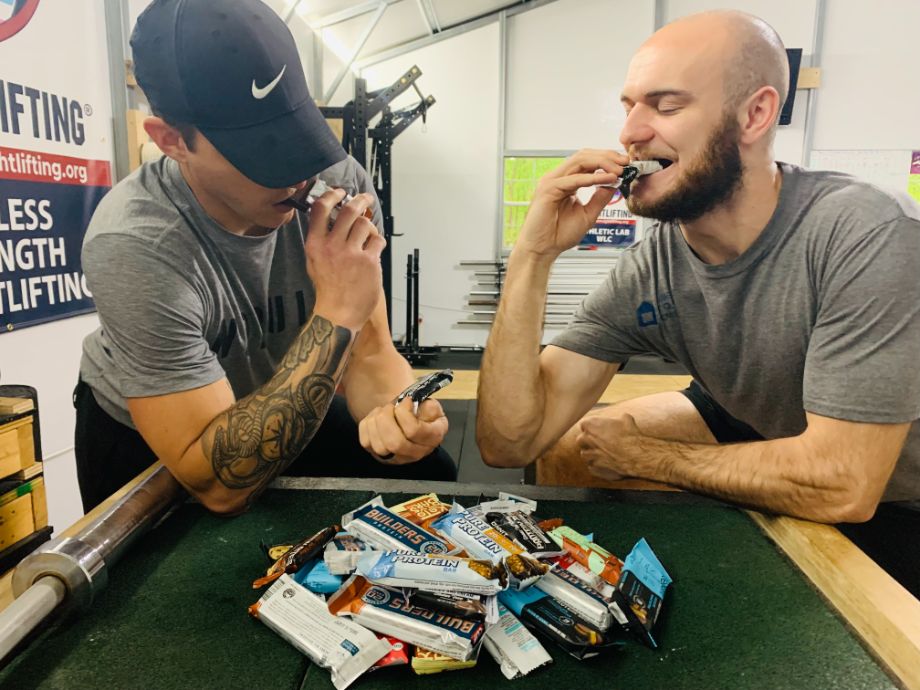We test and review fitness products based on an independent, multi-point methodology. If you use our links to purchase something, we may earn a commission. Read our disclosures.
Building muscle requires amino acids, which are found in protein sources. So, if you’re a bodybuilder with increased demands, you might be on the hunt for ways to boost your protein intake. Because let’s be real—there’s only so much meal-prepped chicken you can eat before you start to lose your mind and your appetite. That’s where high-protein snacks and supplements come into play, and protein bars are at the top of the list.
We’ve put dozens of protein bars to the test, analyzing them from all angles to find the best protein bar for bodybuilding. You’re putting in the hard work at the gym with your bodybuilding workouts, and we want to help you nourish your body to maximize that muscle gain. We’re certified personal trainers, elite-level coaches, avid athletes, and registered dietitians, and we used our professional credentials and real-life experiences to provide you with an unbiased review of what we consider to be some of the best products on the market.
RELATED: Best Protein Bars
Medical disclaimer: This article is intended for educational and informational purposes only. It is not intended as a substitute for medical advice. For health advice, contact a licensed healthcare provider.
Best Protein Bars for Bodybuilding
- Best Overall Protein Bar for Bodybuilding: Legion Protein Bars
- Best Budget Protein Bar for Bodybuilding: Power Bars Protein Plus Bars
- Best Natural Protein Bar for Bodybuilding: Transparent Labs Grass-Fed Protein Bars
- Best-Tasting Protein Bar for Bodybuilding: Barebells Protein Bars
- Best Low-Calorie Protein Bar for Bodybuilding: BSN Protein Crisp Bars
- Best Plant-Based Protein Bar for Bodybuilding: ProBar
Best Overall Protein Bar for Bodybuilding: Legion Protein Bars
Good for: Bodybuilders who want a protein-rich snack after a workout or between meals
Best Overall
Legion Athletics Protein Bar
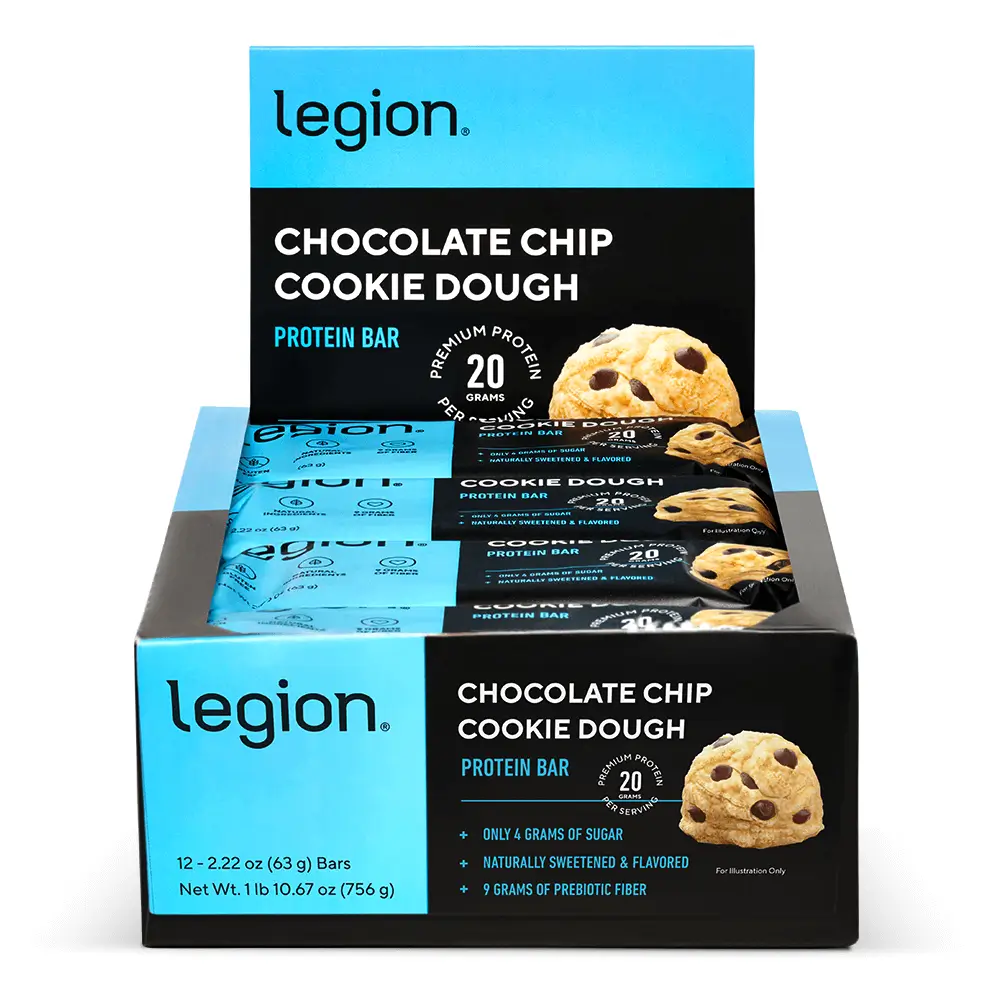
Product Highlights
- Blend of whey and milk protein
- Plant-based carbs, fats, and prebiotic fiber
- Third-party tested
- No proprietary blends
- Money-back guarantee
Pros & Cons
Pros
- All natural
- Non-GMO
- Third-party tested
- Money-back guarantee
- NSF-certified
- FDA-inspected, cGMP facilities
Cons
- Too hard for some
- Contains stevia and erythritol (a sugar alcohol)
- 4 g of added sugar
Bottom Line
If you are looking for an all-natural protein bar and do not mind a little added sugar, the Legion Athletics Protein Bars are available in two popular flavors.
Legion keeps it real with their Natural Whey Protein Bars, earning them the title of best overall protein bar for bodybuilding. They contain no proprietary blends or banned products, and they’re made right here in the USA. Plus, Legion isn’t trying to oversell its product. These protein bars aren’t advertised as meal replacement bars or pre-workout supplements. Nope—they’re simply a source of high-quality protein to help those with increased demands meet their needs. Looking at you, bodybuilders.
Each Legion protein bar is packed with 20 grams of protein sourced from a blend of whey and milk proteins. They’re made primarily of whey protein concentrate, but they also contain milk protein and whey isolate.
RELATED: Whey Protein Concentrate vs Isolate
The other nutrition facts will vary, depending on the flavor you choose (blueberry muffin, chocolate chip cookie dough, chocolate peanut butter, or peanut butter and jelly). Still, you can expect 240 to 250 calories, 11 to 12 grams of fat, and 24 to 29 grams of carbohydrates per bar. Plus, each bar provides 6 to 9 grams of fiber. Yay, gut health!
GGR Head of Content Kate Meier and her weightlifting teammates put Legion Natural Whey Protein Bars to the test and gave them a thumbs up overall:
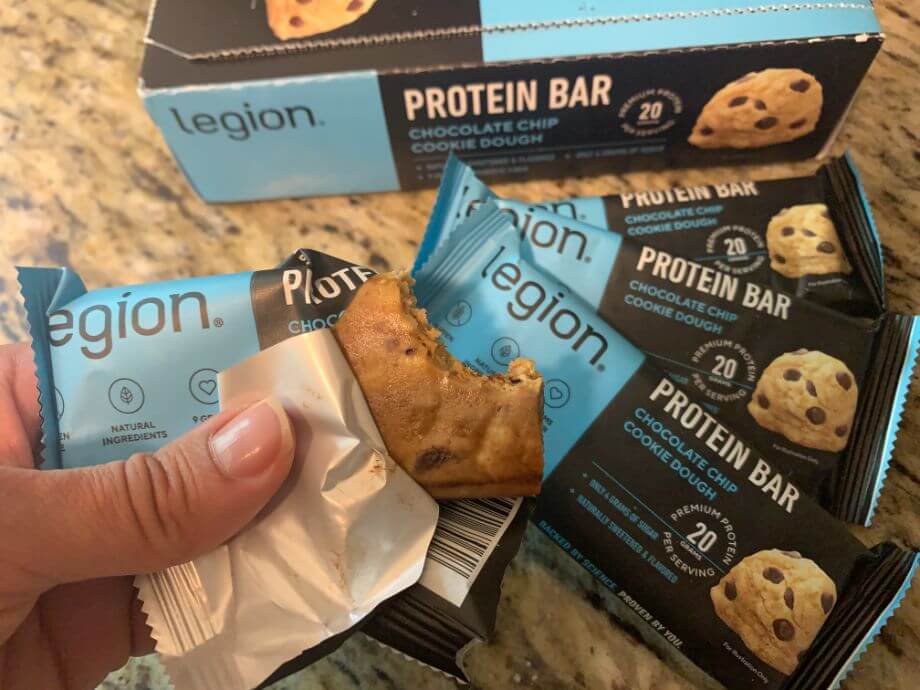
“These are pretty good, both taste and macro-profile-wise. I didn’t want to finish the cookie dough bar (it didn’t taste dough-y enough for me), but I wanted to finish the chocolate peanut butter one. And 20 grams of protein is a good selling point for me, especially a higher-calorie bar like this,” she says.
Kate and her crew gave the protein bars a 4 out of 5 for taste, emphasizing the use of chocolate in the flavors.
“Most of us mostly liked the flavors,” she says. “The chocolate chip cookie dough bar has some flavor; the chocolate doesn’t come through enough for me. The chocolate peanut butter bar has a much stronger flavor, and YES CHOCOLATE COMES THROUGH. I prefer the chocolate peanut butter. I’d give the taste of the dough bar a 3, and the chocolate peanut butter a 4 out of 5.”
Their texture was a little deceiving. Kate said it best when she said, “It LOOKS like it will be a moist, chewy bar, but it’s a little drier than I expected. It definitely sticks in your teeth a little bit. I thought it would be the consistency of a Lara Bar, but it’s a little drier than that. One of our testers commented that the bar feels very dense—takes a lot of chewing.” In all, the protein bar’s texture scored a 3 out of 5.
| Protein Per Serving | 20 g |
| Protein Source | Whey protein isolate, whey protein concentrate, milk protein isolate |
| Calories Per Serving | 250 |
| Flavors | Blueberry Muffin, Peanut Butter and Jelly, Chocolate Peanut Butter, Chocolate Chip Cookie Dough |
Best Budget Protein Bar for Bodybuilding: Power Bars Protein Plus Bars
Good for: Bodybuilders who don’t want to spend an arm and a leg on their protein supplement
Best Budget
PowerBar Protein Plus Bars
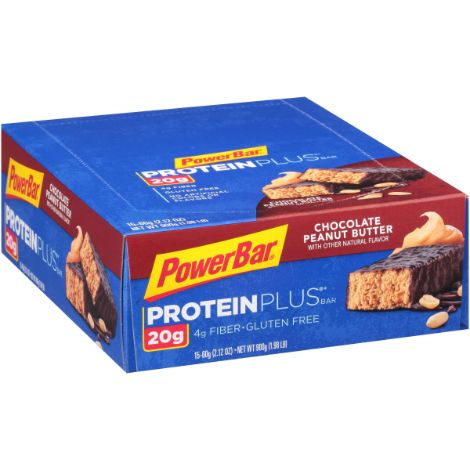
Product Highlights
- 20 g of protein
- Gluten-free
- No artificial flavors or colors
- Available in 4 flavors
Pros & Cons
Pros
- No artificial flavors or colors
- 20 g of protein
- Gluten-free
- Inexpensive
Cons
- Higher sugar content
- Some reviews don’t like the texture of the bar
Bottom Line
With 20 grams of protein in one bar, PowerBar Protein Plus Bars are a good high-protein snack. Additionally, the protein bars have no artificial flavors or colors, and are also gluten-free and soy-free. Protein Plus Bars come in four flavors: Chocolate Peanut Butter, Peanut Butter Cookie, Cookies and Cream, and Vanilla.
For those of us on a budget, PowerBar has our back. At just $1.38 per bar on Amazon, their Protein Plus Bars are one of the more affordable bars available, and you don’t have to sacrifice protein content to save money.
Each bar provides 20 grams of protein sourced from soy protein isolate, calcium caseinate, and whey protein isolate. However, don’t go skipping any meals to fit these into your daily intake. Protein Plus Bars are more of a snack bar, as they only provide 210 calories, 5 to 6 grams of fat, and around 25 to 27 grams of carbs per bar. Additionally, they have a much lower fiber content than other bars—only 4 grams per bar.
Erin Chancer, GGR senior editor, gave PowerBar Protein Plus Bars a try:
“These bars are what they are; no more, no less,” she said. “Also, for something called “protein plus” I’d want there to be a little more protein. Having 20 grams isn’t nothing, but most bars have this amount. Lastly there are 13 grams of sugar per bar, which is a dealbreaker for me.”
Erin wasn’t overly impressed by their taste, but she wasn’t disappointed either, giving them a 3.5 out of 5 for taste.
“The taste was alright, not great but not terrible. There is definitely an aftertaste,” she said.
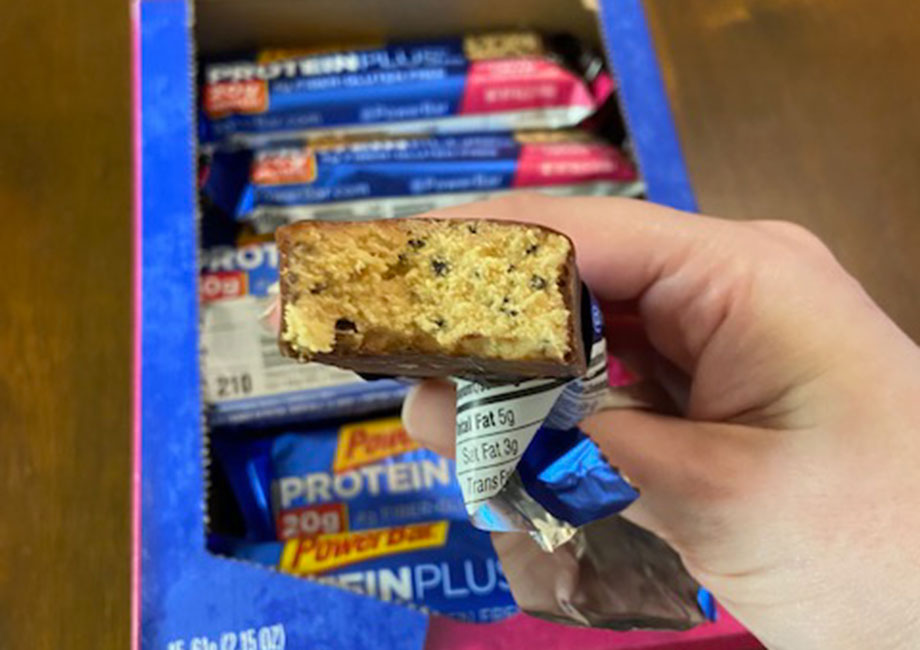
That aftertaste may result from the sweeteners used: maltitol syrup and cane inverted syrup. These sweeteners taste distinctly sweet and can help prolong the product’s shelf life. However, maltitol syrup has been linked1 to gastrointestinal side effects, such as bloating and diarrhea. This may be something to consider if you’re prone to GI upset with protein supplements.
The protein bar’s texture fared a little better, earning a 3.8 out of 5 from Erin. The inverted sugar should theoretically help retain moisture and contribute to a smoother consistency. Still, according to Erin’s experience, the texture was “slightly chalky but otherwise pretty good.”
| Protein Per Serving | 20 g |
| Protein Source | Soy protein isolate, calcium caseinate, whey protein isolate |
| Calories Per Serving | 210 |
| Flavors | Chocolate Peanut Butter, Cookies and Cream, Vanilla, Peanut Butter Cookie |
Best Natural Protein Bar for Bodybuilding: Transparent Labs Grass-Fed Protein Bars
Good for: Bodybuilders who try to avoid artificial ingredients.
Best Natural
Transparent Labs Grass-Fed Protein+ Bars
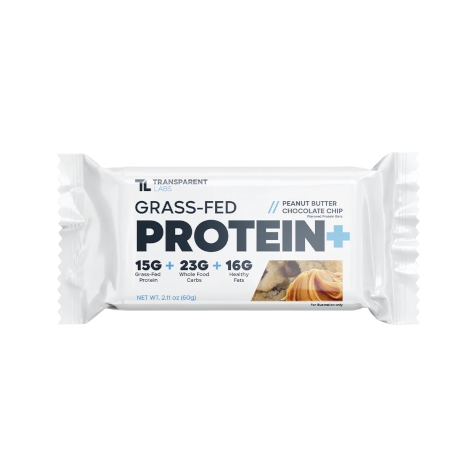
Product Highlights
- Protein bar with grass-fed whey protein isolate
- 15 g of protein
- No artificial sweeteners, flavors, or preservatives
- Available in Peanut Butter Chocolate Chip
Pros & Cons
Pros
- Grass-fed whey protein isolate
- No artificial sweeteners, flavors, or preservatives
- Balanced macro profile
Cons
- Pricier protein bar
- Only one flavor
- Not as much protein as other bars
Bottom Line
Transparent Labs Grass-Fed Protein+ Bars are a protein bar with no artificial ingredients. With 15 grams of protein, the protein bar claims to have a balanced macronutrient profile—23 grams of carbs and 16 grams of fat. While the protein content could be a bit higher, the protein is high-quality, coming from grass-fed whey isolate.
Like their protein powders, Transparent Labs’ Grass-Fed Protein+ Bars pack a punch! The protein bars are only available in one flavor (peanut butter chocolate chip), but the first item on the ingredients list is peanut butter. And since ingredients are listed by weight in descending order, peanut butter makes up most of the product.
Peanuts are a natural source of healthy fats, so these protein bars have a higher fat content than other products on the market, especially compared to the protein content. Each bar provides 15 grams of protein and 16 grams of fat. Talk about a nutrient-dense protein bar! This spoke volumes to Kate Meier, head of content at GGR, who tested the protein bars and shared her experience:
“This is like, a whole meal. It’s NOT low-fat. But I like how clean the formula is! No junk, just real ingredients. That’s the biggest selling point for me on these,” she said.
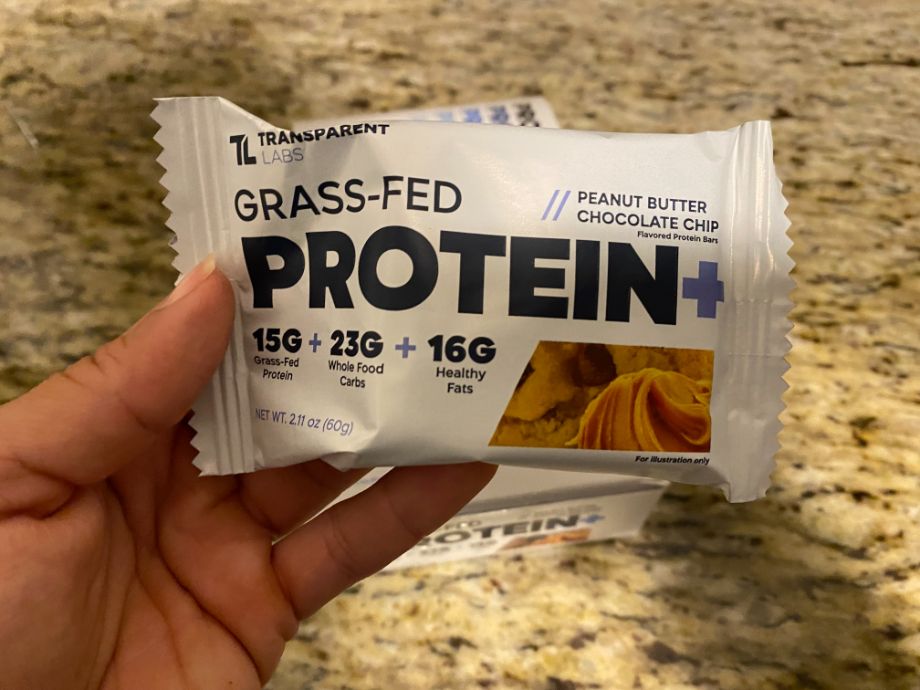
Kate gave the Grass-Fed Protein+ Bars a 4 out of 5 for taste:
“Four of us tried these, and we all agree that they do have a very clean peanut butter and chocolate taste. The pieces of chocolate are real, delicious, melt-in-your-mouth chocolate. They don’t taste super protein-y like other bars do, which I really like because I often find it hard to stomach protein bars. I’m not much of a bar person, but I could keep these on-hand for those days when I’m rushed and just need something in my stomach that is clean and has a decent amount of protein.”
Texture fared the same with a 4 out of 5. “These are a little dry,” Kate said. “They aren’t crunchy; they are meant to be like an Rx bar, using dates to make them soft and chewy. And they are soft and chewy, but they still dry out your mouth a little. But also there are real pieces of chocolate in there and it’s a delight. An absolute delight.”
These protein bars don’t necessarily have enough calories to be considered a meal replacement bar, like their cost implies, hence the 3 out of 5 score for price. However, they can be a decent investment for those who want to bridge the gap and ensure they get enough protein to support their muscle gain goals.
| Protein Per Serving | 15 g |
| Protein Source | Peanut butter and grass-fed whey protein isolate |
| Calories Per Serving | 280 |
| Flavors | Peanut Butter Chocolate Chip |
Best-Tasting Protein Bar for Bodybuilding: Barebells Protein Bars
Good for: Bodybuilders who just want a supplement that tastes good for a change
Best-Tasting
Barebells Protein Bars
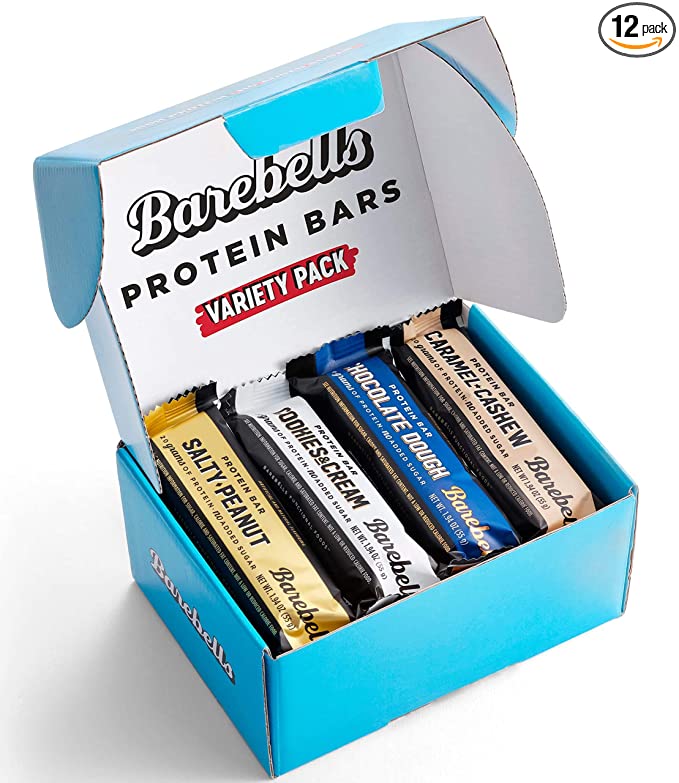
Product Highlights
- High-protein bars offered in a range of both plant-based and milk-based options
- No added sugar
- Created in 2016 in Sweden as a healthy alternative to snacks and desserts which mimic a candy bar texture
- Plant-based flavors: Salty peanut, hazelnut nougat
- Milk protein blend flavors: Cookies & cream, chocolate dough, caramel cashew, salty peanut, creamy crisp, hazelnut nougat, white chocolate almond, and crunchy fudge
- Nutritional counts vary by flavor but average around 8–10 g of fat, 19–27 g of total carbohydrates, 6–7 g of fiber, 1 g of sugar, 6 g of sugar alcohol, and 15–20 g of protein
Pros & Cons
Pros
- Well-reviewed taste
- Variety of flavors
- Plant-based options
- Candy bar–like texture
Cons
- Relatively expensive
- Contains sucralose
Bottom Line
Barebells Protein Bars are one of the few protein bars on the market that effectively mimic the texture of a candy bar, delivering a high-protein and low-to-no sugar snack alternative.
If you’re looking for a protein bar that scores 5 out of 5 for taste AND texture, Barbells Protein Bars might be your answer. These low-sugar protein bars are available in 13 unique flavors, including banana caramel, salted caramel peanut, and chocolate dough. With 15 to 20 grams of protein and 190 to 210 calories per bar they can be a healthy snack, and their great taste can help satisfy sweet cravings.
GGR Senior Editors Nicole Davis and Erin Chancer tested the protein bars, and they both gave the bars two thumbs up.
RELATED: Best Tasting Protein Bars
“I got the sampler pack with Chocolate Dough, Caramel Cashew, Salty Peanut, and Cookies and Cream. The Chocolate Dough one is the most superior by far…tastes legimately like a candy bar…I am shocked, tbh. The chocolate coating outside tastes like real chocolate, and the nougat pieces provide a nice crunch,” said Nicole.
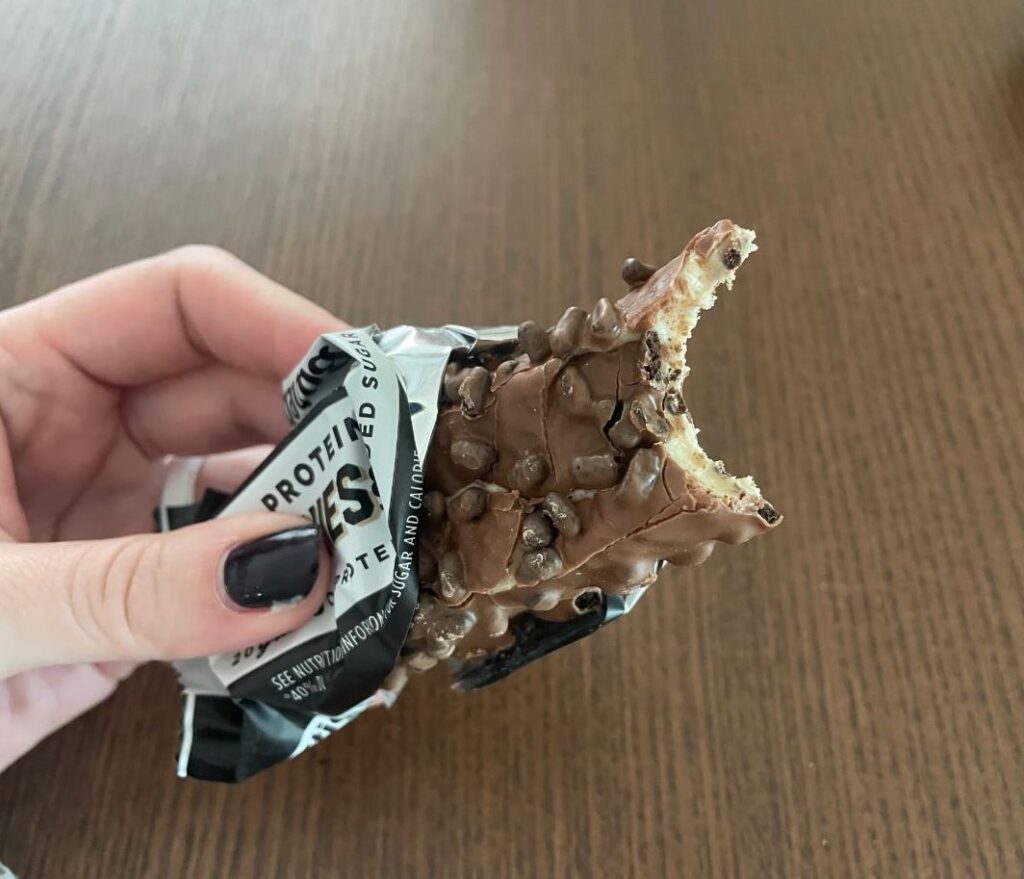
Erin echoes the same:
“These protein bars are delicious,” she says. “They have no added sugar and use sucralose but don’t have that strong artificial sweetener aftertaste. My favorite of the four flavors is the Caramel Cashew; I had to keep checking the label to make sure I wasn’t actually eating a candy bar.”
Nicole also hyped up the protein bar’s texture, saying, “Great! Soft and chewy on the inside and crunchy on the outside from the nougat pieces and chocolate coating. The Chocolate Dough was almost like a 100 Grand bar, which is my ultimate favorite candy bar.”
| Protein Per Serving | 15-20 g |
| Protein Source | Calcium caseinate, whey protein concentrate, whey protein isolate |
| Calories Per Serving | 190-210 |
| Flavors | Salty Peanut, Caramel Cashew, Choco Hazelnut, Chocolate Dough, Cookies and Cream, Creamy Crisp, Hazelnut and Nougat, Plant-Based Hazelnut and Nougat, Banana Caramel, Salted Peanut Caramel, White Chocolate Almond, Minty Chocolate, Caramel Choco |
Best Low-Calorie Protein Bar for Bodybuilding: BSN Protein Crisp Bars
Good for: Bodybuilders who want to preserve lean muscle mass while cutting weight
Best Low-Calorie
BSN Protein Crisp Bars
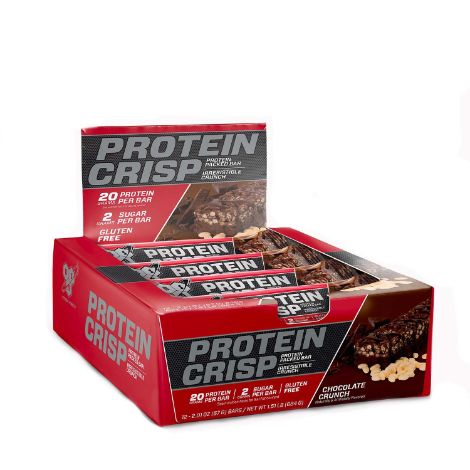
Product Highlights
- 20 g of protein from milk, whey and soy
- Made with a crunchy texture
- Gluten-free
- Only 2-5 g of sugars
- Six flavors
Pros & Cons
Pros
- 20 g of protein
- Gluten-free
- 6 flavors
- Low sugar
Cons
- Pricier protein bar
- Contains soy
- Contains artificial flavors
Bottom Line
Made with a crunchy texture, BSN Protein Crisp Bars provide 20 grams of protein from a blend of whey, milk, and soy protein. The protein bars contain low added sugars, and come in six different flavors as well.
Bodybuilders who want to maintain lean muscle mass during weight loss efforts often look for low-calorie, high-protein bars. While most protein bars provide around 20 grams of protein per serving, few do it while keeping total calories low. That’s where BSN Protein Crisp Bars break away from the norm.
RELATED: Best Low-Calorie Protein Bars
BSN Protein Crisp Bars are available in four flavors, most of which provide less than 200 calories per bar without sacrificing protein content. Each bar provides 18 to 20 grams of protein sourced from whey protein concentrate, whey protein isolate, and soy protein isolate.
GGR staff writer Lauren Strong put these crispy protein bars to the test:
“Texture and flavor are good. It’s a pretty big bar though, I thought it would be at least 25 grams of protein,” she said.
Lauren gave these protein bars a 4 out of 5 for taste, saying, “I tried the Salted Toffee Pretzle, which was pretty darn good. It’s not my favorite bar I’ve ever tried but it’s better than just OK. I like the flavor and texture. It’s sweet without being too much. It’s also not fully dipped in chocolate (just on the bottom and a drizzle on top). Sometimes the fully-dipped protein bars are so gross to me, because it’s not real chocolate.”
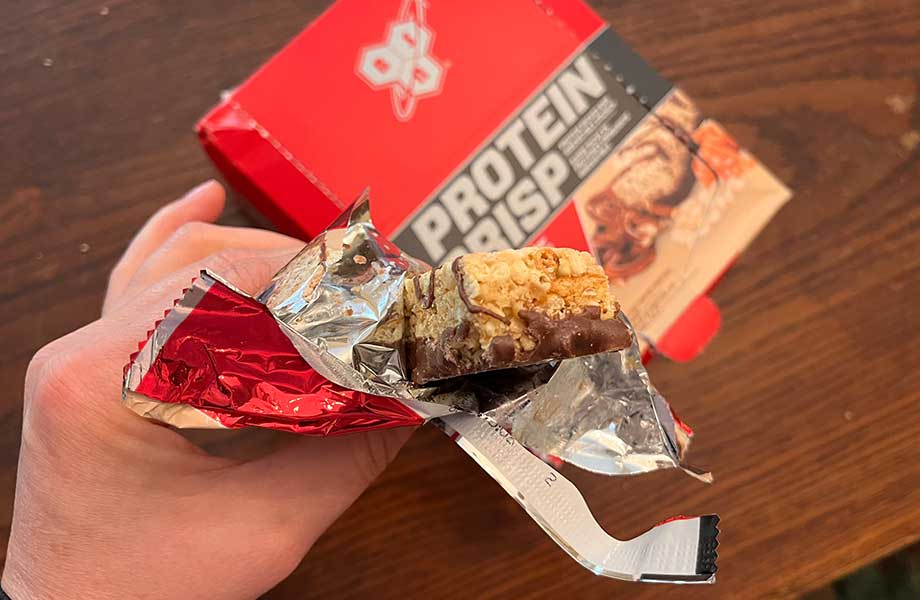
She went on to praise their texture, giving them a perfect 5 out of 5:
“This bar has the crispy puffed rice texture, so it’s chewy and actually feels like you’re eating food versus a leather-like texture. There is also chocolate on the bottom and a drizzle on top. It breaks apart if you want it to, but can stay together easily, too,” she said.
Something to remember when shopping for the best protein bars for weight loss is that protein bars that are low in sugar are often sweetened with sugar alcohols, as is the case for these BSN Protein Crisp Bars. Sugar alcohol can cause GI upset in some people when consumed in large amounts. Be mindful of portion sizes and frequency of consumption, mainly if your supplement stack also includes protein shakes and other foods sweetened with sugar alcohols.
| Protein Per Serving | 18-20 g |
| Protein Source | Whey protein concentrate, whey protein isolate, soy protein isolate |
| Calories Per Serving | 180-230 |
| Flavors | Salted Toffee Pretzel, Chocolate Crunch, Peanut Butter Crunch, Vanilla Marshmallow |
Best Plant-Based Protein Bar for Bodybuilding: ProBar
Good for: Bodybuilders following a plant-based lifestyle
Best Plant-Based
ProBar Protein Bars
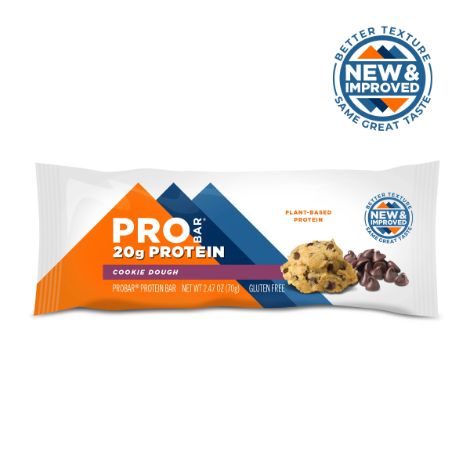
Product Highlights
- 20 g of soy protein isolate
- Available in 6 flavors
- Plant-based ingredients
- Non-GMO
- Gluten-free and dairy-free
- Contains 5 g of fiber
Pros & Cons
Pros
- Gluten-free
- Dairy-free
- Vegan-friendly
- Non-GMO
- 5 g of fiber
Cons
- Added sugars
- Contains soy
Bottom Line
PROBAR Protein Bars contain plant-based ingredients, making this a vegan-friendly snack filled with 20 grams of soy protein isolate. These protein bars are verified as non-GMO, and they’re also gluten-free and dairy-free as well. Additionally, these bars come in six flavors, and have about 5 grams of fiber, depending on the flavor.
In our search for the best vegan protein bar for bodybuilders, we came across the 100% plant-based bar from ProBar. Made from non-GMO, gluten-free, whole-food ingredients, the ProBar is a vegetarian-friendly addition to your protein supplement routine.
Each bar provides 20 grams of protein, 7 to 9 grams of fat and 32 to 34 grams of carbs—aka not a low-carb protein bar! ProBar uses soy protein isolate to support plant-based muscle building. With around 270 calories per bar, these are a great post-workout snack.
GGR editor Frieda Johnson put the ProBar Protein Bars to the test, and they got her stamp of approval:
“I really liked these and would purchase them again. For being plant-based, I was impressed that they tasted like a treat but filled me up between meals,” she said.
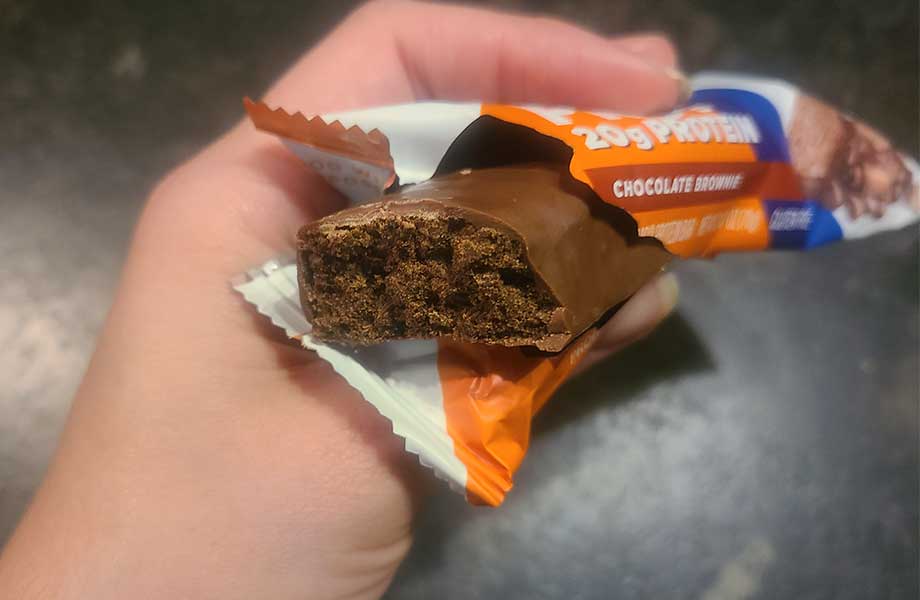
So, what stood out during Frieda’s experience with the ProBars? Their taste and texture were two of the highlights, each scoring a 4.5 out of 5. There are six flavors, each with a unique ingredient list and sweetened with simple ingredients like tapioca syrup and cane sugar.
“My favorite was the Mint Chocolate, but I enjoyed all of the flavors I tried. They are definitely one of the best-tasting plant-based protein bars I’ve tried,” said Frieda.
And the texture? Frieda was a fan:
“These are chewy with some crispy chunks. They are coated in chocolate that actually is good, unlike the waxy stuff a lot of bars use. They are a tiny bit dry, but overall really good.”
| Protein Per Serving | 20 g |
| Protein Source | Soy protein isolate (some flavors include peanuts or other nuts) |
| Calories Per Serving | 260-280 |
| Flavors | Mint Chocolate, Peanut Butter Chocolate, Chocolate Brownie, Coffee Crunch, Sea Salt Caramel, Cookie Dough |
Other Protein Bars for Bodybuilding We Researched
In our search for the best protein bars for bodybuilding, we made a note of the bars that just missed the cut for our list.
- Gatorade Recover Whey Protein Bars: These taste pretty good but are high in sugar and have quite a few preservatives. Each bar provides 20 grams of protein and 39 to 42 grams of carbs, depending on your chosen flavor. Gatorade Recover Protein Bars are available in chocolate chip, chocolate pretzel, cookies and cream, mint chocolate crunch, chocolate caramel, and peanut butter.
- MetRX bars: Although these have 30 grams of protein per bar, which is excellent, they also have over 400 calories, which is not so great. And while they contain nutritious protein sources, like egg whites, they also contain a proprietary protein blend. Bodybuilder or not, most of us like to know precisely what and how much of it we’re eating.
- NoCow: These protein bars provide 20 grams of plant-based protein, and they’re soy, gluten, and dairy-free. Made with rice and pea protein, they’re available in several unique flavors like chocolate fudge brownie, birthday cake, s’mores, and blueberry cobbler. Still, the taste did not score well with us. Granted, no one on our team is entirely plant-based, but none of the testers enjoyed this bar…at all.
- Onnit Protein Bites: These small protein bars from Onnit are a great way to add a little bit of protein to your day, but they likely won’t make a dent in the increased needs of our bodybuilder friends. Each protein bite provides 7 to 9 grams of protein and just 120 to 150 calories. However, if you need a low-calorie way to satisfy your sweet tooth, these come in flavors that harness the decadent taste of dark chocolate.
- Quest Nutrition Protein Bars: These protein bars provide a decent amount of protein per bar, which is great. And while they advertise a low net carb content, it’s important to note that they also contain a significant amount of sugar alcohols to make that happen. Read our full Quest protein bar review to learn more.
How We Picked and Tested the Best Protein Bars for Bodybuilding
Our team of testers is made up of certified personal trainers, registered dietitian nutritionists, elite coaches, and avid athletes who, like you, value health and wellness on all levels. When selecting the protein bars to test, we considered many factors, including brand reputation, macronutrient breakdown, palatability, and price.
We relied on our professional credentials to analyze the nutrition facts and the protein bars’ potential in muscle-building efforts. But our assessments didn’t stop there—we gave each bar a thorough subjective review following the GGR supplement testing methodology to assess their taste, texture, and value for money. We know the importance of trusting a product, so we didn’t cut any corners when making this list.
Benefits of Protein Bars for Bodybuilding
Protein bars are a convenient way to boost your protein intake, especially when your workout routine puts a heightened demand on your body. Whether you’re training for a bodybuilding competition, trying to change your body composition, or aiming for a new PR in the weight room, putting on lean muscle mass is an appropriate goal.
But muscle gain requires protein intake. Thankfully, protein bars are available to bridge the gap between protein needs and protein intake, in addition to many other benefits.
Supports Muscle Gain
Building muscle is a two-step process that starts with breaking down the muscle tissue during training. Then, the body repairs the damaged muscle fibers by fusing them together, adding to their strength and size. To repair muscle tissue, the body relies on amino acids, often called the building blocks of life.
You can get high-quality protein from a variety of sources, but there’s only so much meal-prepped chicken breast you can eat without losing the taste for it. Protein bars add variety to your protein intake and can help boost your macro intake between meals.
RELATED: High-Protein Foods
Supports Weight Management Efforts
Protein bars are a convenient source of nutrients that can help you reach your body weight goals. Training for a bodybuilding competition is often done in phases that involve bulking and cutting weight. When included mindfully in a well-balanced diet, with training demands in mind, protein bars can help with weight loss or gain.
Convenient Source of Nutrients
Protein bars are usually nutrient-dense supplements packed with various micro and macronutrients. For example, many are a good source of dietary fiber, supporting digestive health and keeping you fuller for longer. Some protein bars also contain many essential vitamins and minerals. Be sure to read the nutrition facts label to get a clear understanding of what each bar provides.
Dosing and Interactions
The current Recommended Dietary Allowance2 (RDA) for protein is 0.8 grams of protein per kilogram of body weight, but we’re seeing that may fall short of the average adult’s actual needs—and that’s not accounting for any increased demands from exercise, let alone bodybuilding.
Of course, nutrition needs are individualized, especially when training for bodybuilding competitions. However, research shows3 that bodybuilders need between 1.6 and 2.2 grams of protein per kilogram of body weight. Consider this increased demand when shopping for protein bars to ensure you meet your daily protein needs without exceeding your calorie goals.
Additionally, some protein bars may cause GI bloating or discomfort. If you’re sensitive to protein supplements, carefully review the nutrition label to avoid ingredients like sugar alcohols that often trigger GI symptoms. If you have questions about incorporating protein bars into your bodybuilding supplement stack, consider reaching out to a registered dietitian.
Buying Guide: What to Look for in Protein Bars for Bodybuilding
Not all protein bars are created equally, so you’re smart to do your research before choosing a product. Here are a few factors we considered while searching for the best protein bars for bodybuilding:
Protein Per Serving
The purpose of most protein bars is to provide you with a boost of protein to supplement your intake and get you closer to meeting your daily needs. So, obviously, the amount of protein per serving is an important factor in your search for the right protein bar for your needs.
Consider the grams of protein per serving and how that compares to the total calories provided. Does the protein provided make a dent in your needs without overdoing it on calories?
Cost Per Serving
With today’s grocery bills looking the way they do, it’s only natural to budget accordingly with your sports nutrition supplements, too. Consider how much protein you get with each bar and how the cost compares to other products on the market.
Typically, if a protein bar is supposed to be a meal replacement bar, it will cost more than those that are more of a snack for in-between meals. Either way, make sure adding a protein bar to your diet makes financial sense.
RELATED: Protein Snack Ideas
Macronutrient Ratio
Bodybuilding is a science; even the slightest deviation from the plan can alter the course. For this reason, it’s crucial to analyze the macronutrient ratio of your protein bar options. Most athletes in the bodybuilding community carefully track their macro intake, and since the protein bar industry is so broad, there is a wide spectrum of products to choose from.
Find the protein bar that provides you with a good balance of macronutrients that fit into your dietary intake. Make sure the carb-to-protein ratio works for your training demands, and try to limit saturated and trans fats when possible.
Protein Bars for Bodybuilding: FAQs
What protein bars are the best for bodybuilding?
The best protein bar for bodybuilding will vary depending on which bodybuilder you ask, and it’s important to remember that we all have unique nutrition needs. The best protein bar for you will depend on several factors, including your physical demands, daily protein needs, taste preferences, and budget.
Here are our top picks:
–Best Overall Protein Bar for Bodybuilding: Legion Protein Bars
–Best Budget Protein Bar for Bodybuilding: Power Bars Protein Plus Bars
–Best Natural Protein Bar for Bodybuilding: Transparent Labs Grass-Fed Protein Bars
–Best-Tasting Protein Bar for Bodybuilding: Barebells Protein Bars
–Best Low-Calorie Protein Bar for Bodybuilding: BSN Protein Crisp Bars
–Best Plant-Based Protein Bar for Bodybuilding: ProBar
Are protein bars good for muscle growth?
Protein bars can be a great way to supplement your protein intake when trying to gain muscle. Building muscle requires amino acids, and if your training schedule increases that need to repair damaged muscle fibers, your diet may fall short. Protein bars can bridge the gap and support muscle growth.
Are Builders protein bars healthy?
Clif Builders protein bars offer 20 grams of protein per bar, which is great, but the rest of the nutrition facts have most experts doing a double-take. Each bar contains 6 grams of saturated fat, 330 milligrams of sodium, and 17 grams of added sugar; that’s a lot to navigate.
Are Perfect Bars good for building muscle?
When included mindfully in a well-balanced diet, Perfect Bars can support muscle growth. Each bar provides around 17 grams of protein and 340 calories. Knowing the carb content is essential, as each bar provides 27 grams of carbs with 13 grams of added sugar. Hello, blood sugar spike. So, timing is key when eating a Perfect Bar protein bar.
These statements have not been evaluated by the Food and Drug Administration. This product is not intended to diagnose, treat, cure, or prevent any diseases.
References
- Saraiva A, Carrascosa C, Raheem D, Ramos F, Raposo A. Maltitol: Analytical Determination Methods, Applications in the Food Industry, Metabolism and Health Impacts. Int J Environ Res Public Health. 2020;17(14):5227. Published 2020 Jul 20. doi:10.3390/ijerph17145227
- Lonnie M, Hooker E, Brunstrom JM, et al. Protein for Life: Review of Optimal Protein Intake, Sustainable Dietary Sources and the Effect on Appetite in Ageing Adults. Nutrients. 2018;10(3):360. Published 2018 Mar 16. doi:10.3390/nu10030360
- Iraki J, Fitschen P, Espinar S, Helms E. Nutrition Recommendations for Bodybuilders in the Off-Season: A Narrative Review. Sports (Basel). 2019;7(7):154. Published 2019 Jun 26. doi:10.3390/sports7070154
Further reading

What is intermittent fasting and how does it work? Our beginners guide covers everything from the benefits and risks to tips and tricks for implementing IF. Read more

If you’re looking for clinical-grade training and recovery tools, our GGR-exclusive Smart Tools coupon can help you save on your next purchase. Read more

Chalk Monsteris a company producing chalk that features 100% Magnesium Carbonate. It's priced well, not easily breakable, and comes with cool, unique branding. We recommend it if you're unsatisfied with other standard options. Read more

The Adidas Leistung Weightlifting Shoes are Adidas latest weightlifting shoes that feature a BOA dial and many unique features. Read more

